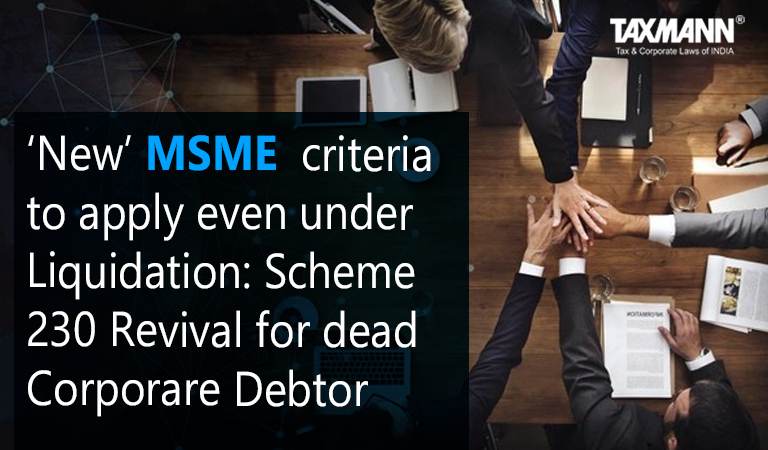‘New’ MSME criteria to apply even under Liquidation: Scheme 230 Revival for dead Corporare Debtor
- Blog|News|Insolvency and Bankruptcy Code|
- 2 Min Read
- By Taxmann
- |
- Last Updated on 28 September, 2021

[2021] 130 taxmann.com 416 (Article)
INTRODUCTION
A scheme of Compromise and Arrangement under section 230 of the Companies Act, 2013 has traditionally been used for restructuring the ailing company.
With the onset of the Insolvency and Bankruptcy Code, 2016 these schemes became the catalyst for revival by allowing the same during the liquidation process. The paradox about the applicability of section 29A of the Insolvency and Bankruptcy Code, 2016 to the schemes under section 230 of the Companies Act, 2013 has remained intact after the Apex Court ruled that the disqualification shall continue even under Liquidation. However, the recent ruling of the Hon’ble National Company Law Appellate Tribunal has put such a conundrum to rest. Also, the rationale dealt with the applicability of Notification dated 1-6-2020 (for MSME changed criteria) to the Corporate Debtor that is already undergoing liquidation as of that date.
LEGISLATIVE BACKDROP
It has been a well-settled law that the scheme under section 230 is maintainable for companies in liquidation under the Code but the same is not maintainable at the instance of a person ineligible under section 29A of the Code. The same has been held in the case of Jindal Steel and Power Ltd. v. Arun Kumar Jagatramka [2020] 114 taxmann.com 133 (NCL – AT)wherein NCLAT relied on the observation of the Hon’ble Supreme Court in Swiss Ribbons (P.) Ltd. v. Union of India [2019] 101 taxmann.com 389/152 SCL 365 (SC), that the primary focus of the legislation is to ensure revival and continuation of the corporate debtor and protect it from a corporate death by liquidation.
The Insolvency and Bankruptcy Code, 2016 was enacted to provide comprehensive consolidating legislation with regard to insolvency and bankruptcy in India. Vide the 2018 amendment to the Code section 29A was inserted which basically laid down various disqualifications with respect to the prospective resolution applicant. The insertion of this section caused various difficulties for Micro Small and Medium Enterprises (MSME) since these enterprises were more labor-intensive small business units that could not attract much interest from bidders thereby creating a vacuum of resolution applicants in MSME and consequently pushing them to liquidation. MSME generally attracts interest primarily from a promoter and may not be of much interest to other people.
The Insolvency and Bankruptcy Code (Second Amendment) Ordinance, 2018 has brought relief to the MSME by relaxing the applicability of the provisions of section 29A as regards submission of a resolution plan which specifically waives the applicability of section 29A clauses (c) to (h) in case the Corporate Debtor is a Micro, Small or Medium Enterprise. The government of India vide its notification dated 1-6-2020 issued a revised definition of MSMEs in which value of investment through substantially increased but a cap on the maximum turnover was included. The notable feature of the new and revised definition is the removal of the distinction between Manufacturing and Service. Such changes in criteria of MSME classification created a wider base for Corporate Debtors to fall within the ambit of MSME definition and thus not to fall for ineligibility under section 29A clauses (c) to (h) of the IBC, 2016.
Click Here to Read Full Article
Disclaimer: The content/information published on the website is only for general information of the user and shall not be construed as legal advice. While the Taxmann has exercised reasonable efforts to ensure the veracity of information/content published, Taxmann shall be under no liability in any manner whatsoever for incorrect information, if any.

Taxmann Publications has a dedicated in-house Research & Editorial Team. This team consists of a team of Chartered Accountants, Company Secretaries, and Lawyers. This team works under the guidance and supervision of editor-in-chief Mr Rakesh Bhargava.
The Research and Editorial Team is responsible for developing reliable and accurate content for the readers. The team follows the six-sigma approach to achieve the benchmark of zero error in its publications and research platforms. The team ensures that the following publication guidelines are thoroughly followed while developing the content:
- The statutory material is obtained only from the authorized and reliable sources
- All the latest developments in the judicial and legislative fields are covered
- Prepare the analytical write-ups on current, controversial, and important issues to help the readers to understand the concept and its implications
- Every content published by Taxmann is complete, accurate and lucid
- All evidence-based statements are supported with proper reference to Section, Circular No., Notification No. or citations
- The golden rules of grammar, style and consistency are thoroughly followed
- Font and size that’s easy to read and remain consistent across all imprint and digital publications are applied



 CA | CS | CMA
CA | CS | CMA
